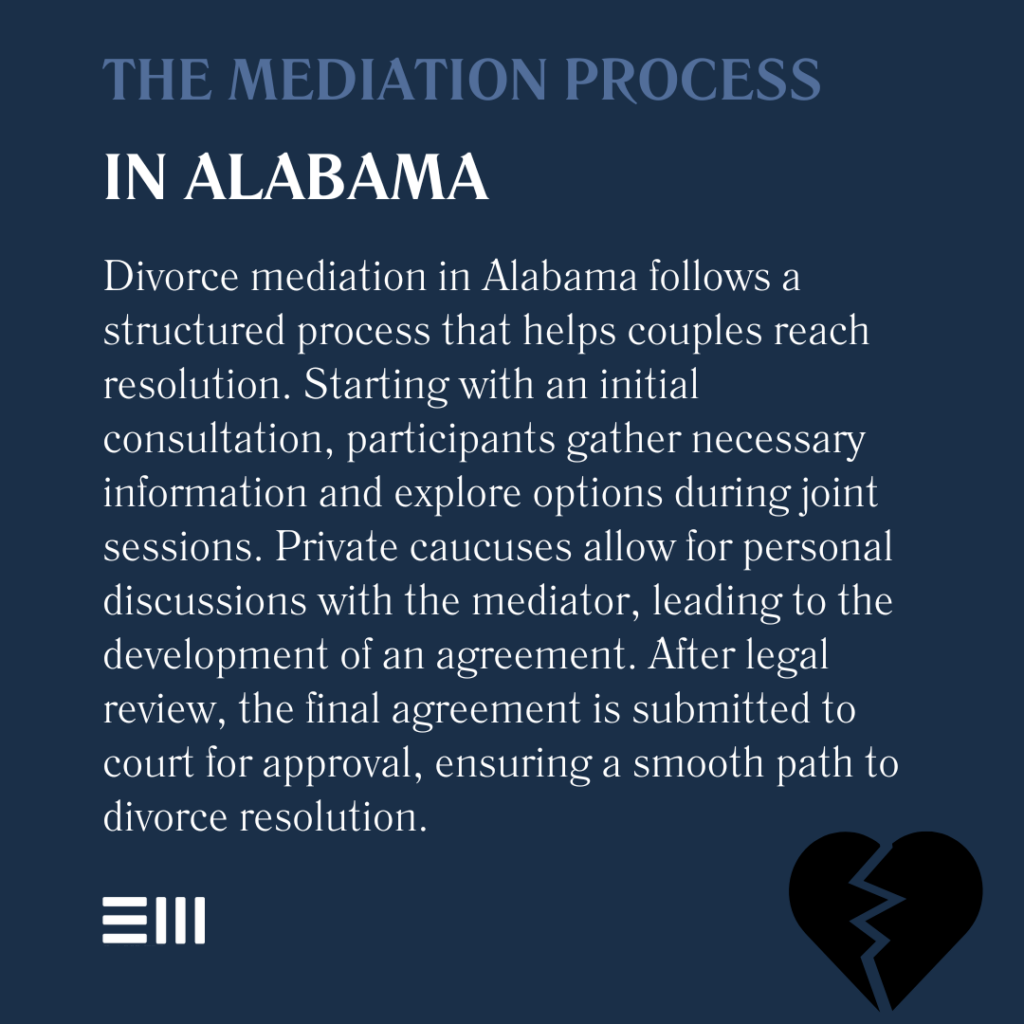
Every successful divorce mediation represents a family choosing collaboration over conflict, opening paths to resolution that courts alone cannot provide.
In Alabama’s family mediation rooms, couples find ways to reshape their futures while preserving their dignity and resources.
Understanding Divorce Mediation
Divorce mediation in Alabama offers couples a private setting to address their divorce-related concerns with professional guidance. This process helps preserve relationships and create sustainable agreements that benefit all family members.
Key benefits of mediation include:
- Time Efficiency: Most mediations conclude within 2-4 sessions, compared to months or years of litigation.
- Cost Savings: Mediated divorces typically cost 60% to 70% less than traditional court battles.
- Privacy Protection: Discussions remain confidential, unlike public court proceedings.
- Relationship Preservation: Maintains civil communication channels, especially important for co-parenting.
- Creative Solutions: Allows for customized arrangements beyond standard court orders.
- Stress Reduction: Creates a cooperative environment focused on problem-solving.
- Future Planning: Develops skills for handling post-divorce challenges effectively.
These advantages make mediation an attractive option for many divorcing couples.
The Mediation Process
Understanding each step of mediation helps participants prepare effectively for their sessions. The process follows a structured yet flexible path toward resolution.
Essential steps include:
- Initial Consultation: Meeting with the mediator to discuss goals and concerns.
- Information Gathering: Collecting financial documents and identifying key issues.
- Joint Sessions: Working together to explore options and potential solutions.
- Private Caucuses: Individual meetings with the mediator to discuss specific concerns.
- Agreement Development: Drafting detailed terms for all resolved issues.
- Legal Review: Having attorneys examine proposed agreements.
- Court Submission: Filing completed agreements for judicial approval.
Following these steps creates a clear path toward divorce resolution.

Common Questions About Divorce Mediation in Alabama
Entering mediation in Alabama often raises important questions for participating couples.
Understanding the process helps create realistic expectations and better preparation.
How Much Does Divorce Mediation Cost in Alabama?
Mediation typically costs between $200-400 per hour, with most cases requiring 8-12 hours total spread across multiple sessions.
Can I Still Have an Attorney During Mediation?
Yes, attorneys can advise clients throughout mediation and review final agreements, though they typically don’t attend sessions.
What Issues Can Be Resolved Through Mediation?
Property division, child custody, support arrangements, and any other divorce-related matters can be addressed through mediation.
Is Mediation Required in Alabama?
While not mandatory for all divorces, many Alabama courts require attempted mediation before proceeding to trial.
What if We Can’t Reach Agreement on Everything?
Partial agreements can be accepted while leaving unresolved issues for court determination.
How Long Does Mediation Usually Take?
Most cases are completed within 2-4 sessions, though complex situations may require additional meetings.
What Makes Mediation Successful?
Willingness to communicate openly, compromise, and focus on future solutions rather than past conflicts supports successful outcomes.
Preparing for Mediation
Proper preparation enhances the likelihood of successful mediation outcomes. Understanding how to prepare helps participants make the most of their sessions.
Important preparation steps include:
- Document Gathering: Collecting financial records, asset information, and relevant paperwork.
- Goal Setting: Identifying primary objectives and acceptable compromises.
- Issue Listing: Creating comprehensive lists of matters requiring resolution.
- Budget Planning: Developing realistic post-divorce financial projections.
- Parenting Considerations: Outlining potential custody and visitation arrangements.
- Communication Practice: Working on constructive discussion techniques.
- Question Development: Preparing specific concerns to address in sessions.
Thorough preparation supports productive mediation sessions.
Working With Your Mediator
A strong working relationship with your mediator facilitates better outcomes. Understanding the mediator’s role helps participants engage effectively in the process.
Key aspects include:
- Neutrality Understanding: Recognizing the mediator’s impartial position.
- Communication Channels: Establishing clear methods for sharing information.
- Scheduling Flexibility: Working within available timeframes for sessions.
- Privacy Guidelines: Understanding confidentiality rules and exceptions.
- Progress Tracking: Monitoring movement toward resolution goals.
- Resource Utilization: Accessing additional support services when needed.
- Feedback Loops: Maintaining open dialogue about process effectiveness.
A clear understanding of these elements supports successful mediation relationships.
Post-Mediation Steps
Following successful mediation, several steps ensure the proper implementation of agreements. Understanding these requirements helps maintain progress toward divorce completion.
Final steps include:
- Agreement Review: Careful examination of all written terms.
- Legal Documentation: Converting mediated agreements into court documents.
- Court Filing: Submitting completed paperwork to appropriate courts.
- Implementation Planning: Creating timelines for executing agreed terms.
- Record Keeping: Maintaining copies of all final documents.
- Contact Updates: Establishing new communication protocols.
- Future Planning: Setting guidelines for handling post-divorce modifications.
Proper attention to these steps ensures mediation achievements translate into lasting arrangements.
Financial Considerations in Mediation
Understanding the financial aspects of mediation helps couples make informed decisions about their divorce process. Proper financial planning ensures both parties can move forward with confidence.
Important financial elements include:
- Cost Comparison: Understanding mediation costs versus traditional litigation expenses.
- Fee Structures: Clear breakdown of mediator rates and payment expectations.
- Document Requirements: Lists of necessary financial records and statements.
- Asset Valuation: Methods for determining fair market value of property.
- Tax Implications: Understanding the tax consequences of various settlement options.
- Future Planning: Development of post-divorce budgets and financial goals.
- Insurance Considerations: Addressing health, life, and property insurance changes.
- Retirement Planning: Evaluating pension and retirement account divisions.
- Debt Management: Strategies for handling joint debts and credit obligations.
Careful attention to financial details supports lasting mediation agreements.
Special Circumstances in Mediation
Some divorce situations present unique challenges that require special consideration during mediation. Understanding these scenarios helps participants prepare for specific issues.
Complex situations include:
- High-Asset Cases: Handling substantial property or business interests.
- International Aspects: Addressing cross-border property or custody matters.
- Military Service: Accommodating active duty responsibilities and benefits.
- Special Needs: Planning for children with ongoing medical or educational requirements.
- Family Businesses: Developing strategies for business continuation or division.
- Hidden Assets: Addressing concerns about financial transparency.
- Domestic Violence: Implementing safety measures and separate sessions.
- Mental Health: Incorporating counseling and support services.
- Substance Abuse: Including treatment and monitoring requirements in agreements.
Proper handling of these situations ensures comprehensive mediation outcomes.
Building Post-Divorce Relationships
Successful mediation often sets the foundation for positive post-divorce interactions. Understanding how to maintain these relationships benefits all parties, especially when children are involved.
Essential elements include:
- Communication Guidelines: Establishing clear protocols for future interactions
- Decision-Making Frameworks: Creating processes for handling new situations
- Conflict Resolution: Developing strategies for addressing future disagreements
- Co-Parenting Tools: Implementing shared calendars and communication platforms
- Boundary Setting: Defining appropriate limits in new relationships
- Support Networks: Building connections with counselors or support groups
- Life Changes: Planning for handling significant future events or modifications
Strong post-divorce relationships support long-term mediation success.
Transform Your Divorce Journey Today
Experience a more collaborative approach to divorce resolution through professional mediation.
Our skilled mediators help guide you toward mutually beneficial solutions while protecting your interests and dignity.
Can't find what you're looking for? Search our site below.










